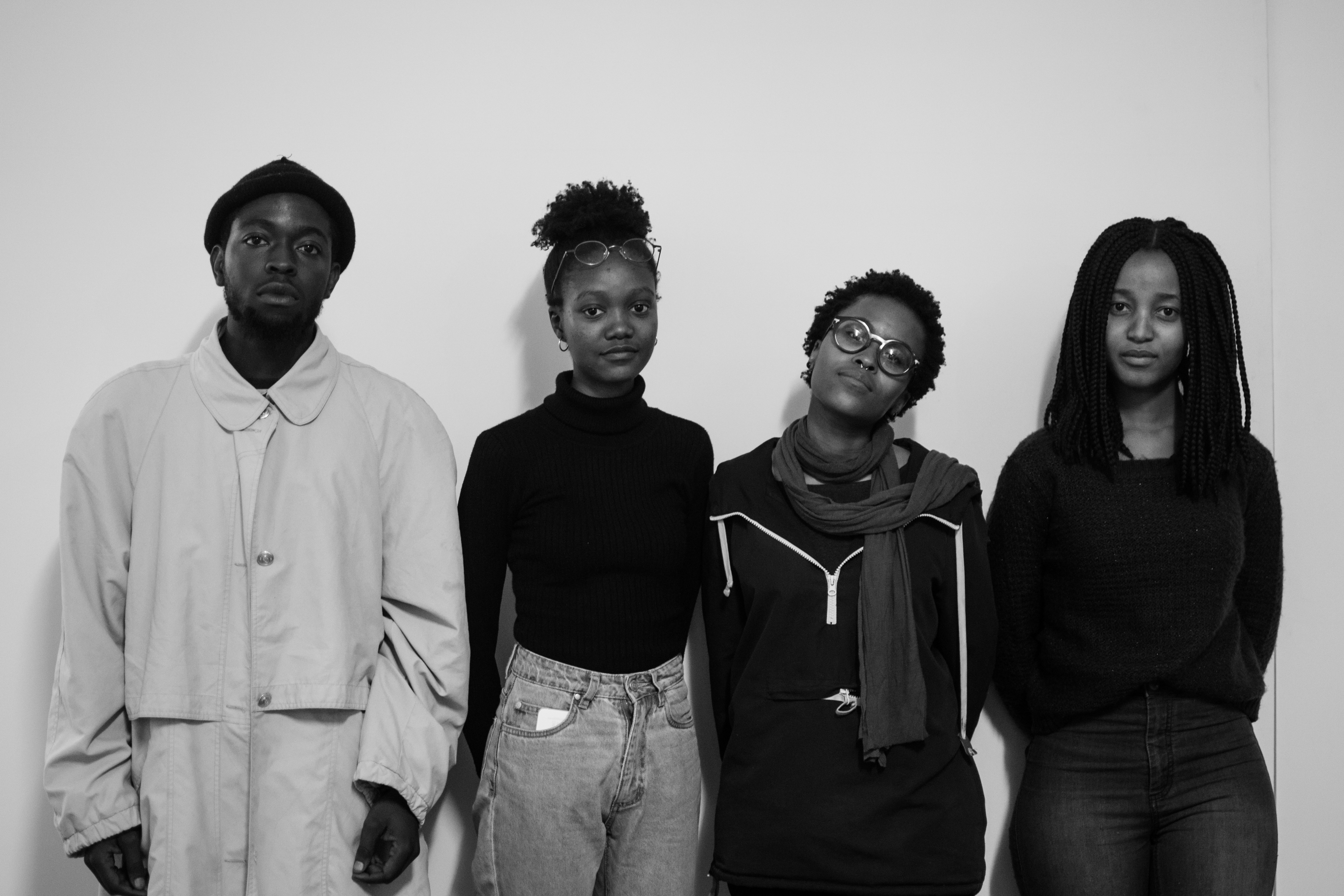“The importance of collectivity solely exists on the support it gives artists of colour in an industry and country engineered to exclude us,” states Malebona Maphutse, a member of the art collective Title in Transgression.
Malebona bonded with the other three members of the collective, Boitumelo Motau, Dineo Diphofa and Simnikiwe Buhlungu, in a History of Art course they found problematic in content and through the skewed socio-political consciousness of the class due to the lack of black students in the course. Individually their work explores themes related to history, archives, visibility and invisibility, forms of knowledge production, forms of ritual healing, rape culture and Black feminisms. Together, they collaboratively explore ideas of collectivity and togetherness through their happenings. An important aspect of their collective process is reviewing each other’s work as a way to “tackle certain perversions of our work”.
As a collective that is not afraid to directly address cultural appropriation, as well as race and gender politics, they have produced zines, tote bags and tshirts with slogans that express their views. “We made shirts with the slogans, ‘Aluta Continua’, ‘Who Polices the Police’ and ‘Teacher Don’t Teach Me Nonsense’ during the 2016 Fees Must Fall protests. We were looking for different ways of engaging with the protests as artists,” Malebona states.
In continuing with the discussion about the themes they address in their work, I asked Title in Transgression about the importance of collective practice and their views on Johannesburg’s art spaces.

What is the importance of collective practice, particularly for you as artists of colour?
(Malebona) We exist as three black females and one black male. The importance of collectivity solely exists in the support it gives artists of colour in an industry and country engineered to exclude us. We find ways to tackle certain perversions of our work by constantly having them in a process of collective review by each member of the group. The four of us do face gendered and racial issues that are part and parcel of the socio-economic and historical status of this country. We find that collectivity grants a space where we can find solutions to financial, racial, and gendered or any other issue through collective think tanks such as collectives.
(Boitumelo) We took inspiration from other art collectives who used aesthetic means to say something they thought is important. Not only are the bags and shirts cool they also carry value in the messages they have.
(Dineo) We created a space for ourselves that in some ways acted as a support system. The world is tough for black women.
(Simnikiwe) As a basis, a support system. Although we must emphasise that Title also exists because of our dynamic as three black womxn (Malebona, Dineo and Myself) and Boitumelo as a male. It’s difficult already as a black artists and it becomes more complex as a black women – we either fall in the box of being invisible or hypervisible. These are the symptoms of the conditions that marginalise us.
As young artists of colour who have recently graduated from Wits, and who have participated in events such as Joburg Fringe and Lephephe hosted by Keleketla! Library, can you please share your views on Johannesburg’s art spaces?
(Malebona) As young individuals/artists Johannesburg art spaces represent a multiplicity of geo, economic and historical politics that we have been navigating. Spaces in Johannesburg that have been left barren by the State because they need to focus on “Land reform” or corruption have left the economy of space in the hands of the white Jewish elite and foreign investors. This is the story of gentrification, and capitalism. We do however recognize that in some way or another we have the agency to not only transform these spaces but occupy them in ways that speak to the current condition of Johannesburg spaces turning into trendy gentrified hubs for the White South African elite. Spaces such as Keleketla! Library are examples to follow. We can exist in parallel to these histories so we can simultaneously contribute to the narrative.
(Simnikiwe) Most art spaces in this city weren’t even made with us in mind. They are not for us. Most of them are white spaces (in their physicality, aesthetics; in their economy, their audiences, their collectors etc.). Thus, by proxy, being a black female artist means we have to navigate and find/immerse ourselves within our own spaces. And a space like Keleketla! Library, which has become our home away from home, has proved to be our point of departure.
As a collective, what are you trying to bring into Johannesburg’s art spaces or understandings of the purpose of art?
(Dineo) I don’t think we’re trying to bring in anything in particular or doing something special , we’re just trying to do our own thing. We’re still trying to understand and navigate these spaces too.
(Simnikiwe) I don’t think I even know to be honest. We are still finding our feet, trying to figure things out. But we are hoping whatever smallanyana things we do can help black [arts] narratives to exist and be visible
Check out Title in Transgression on Instagram to find out more about where they will be next.





















































